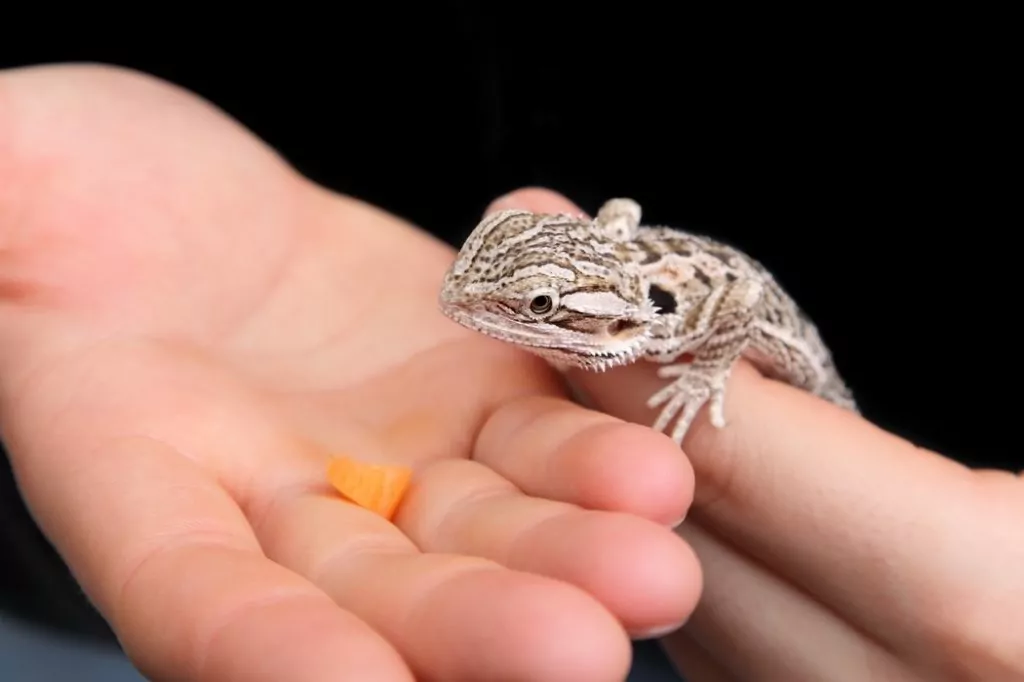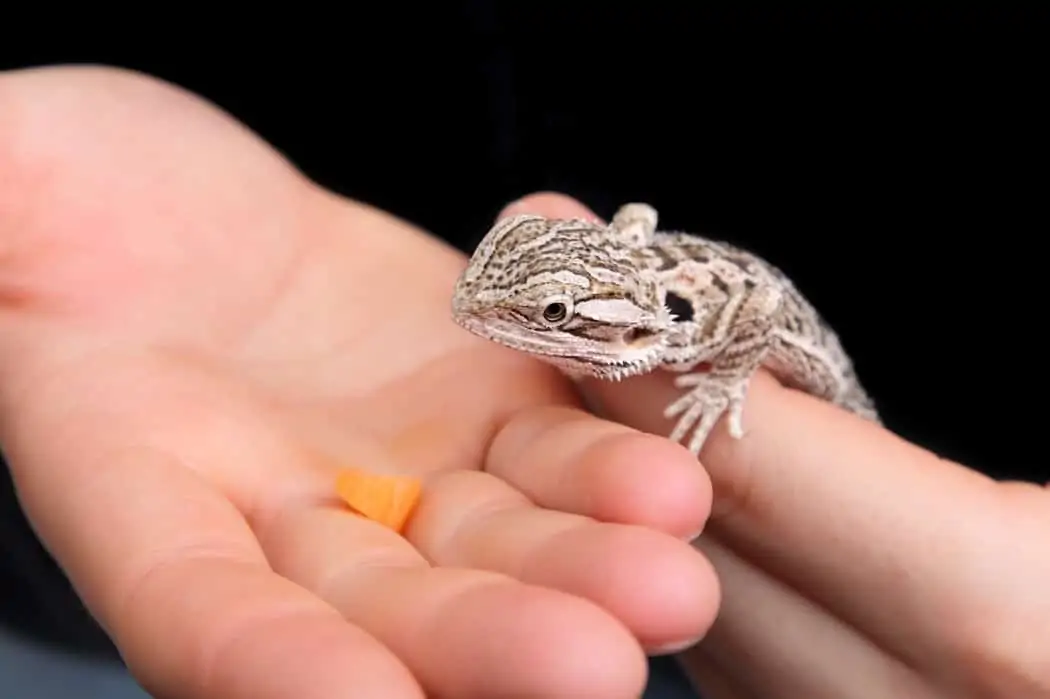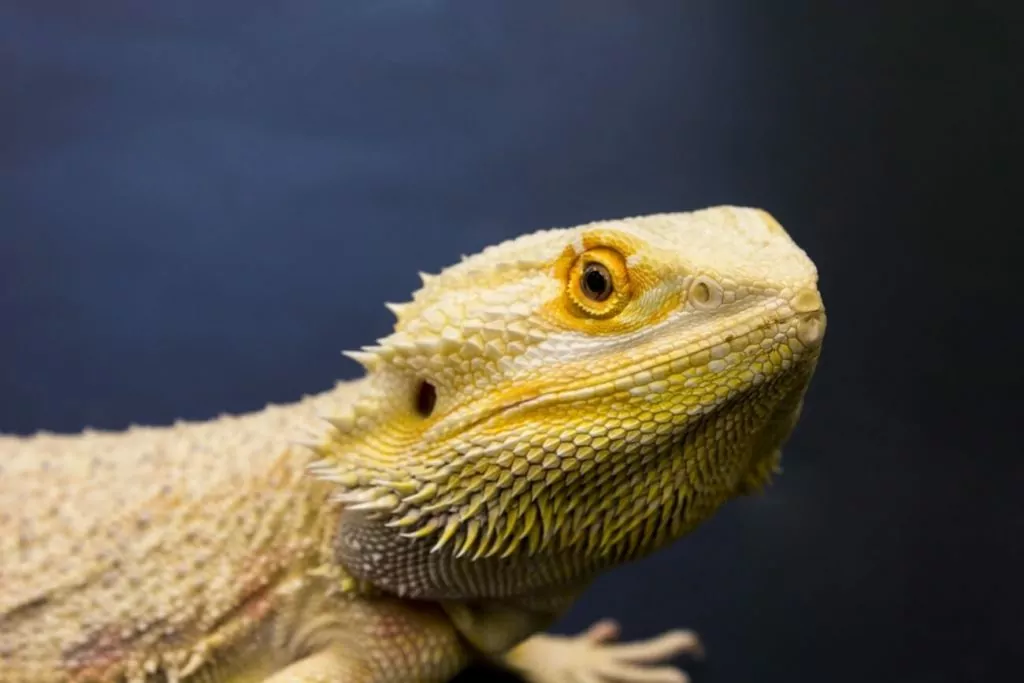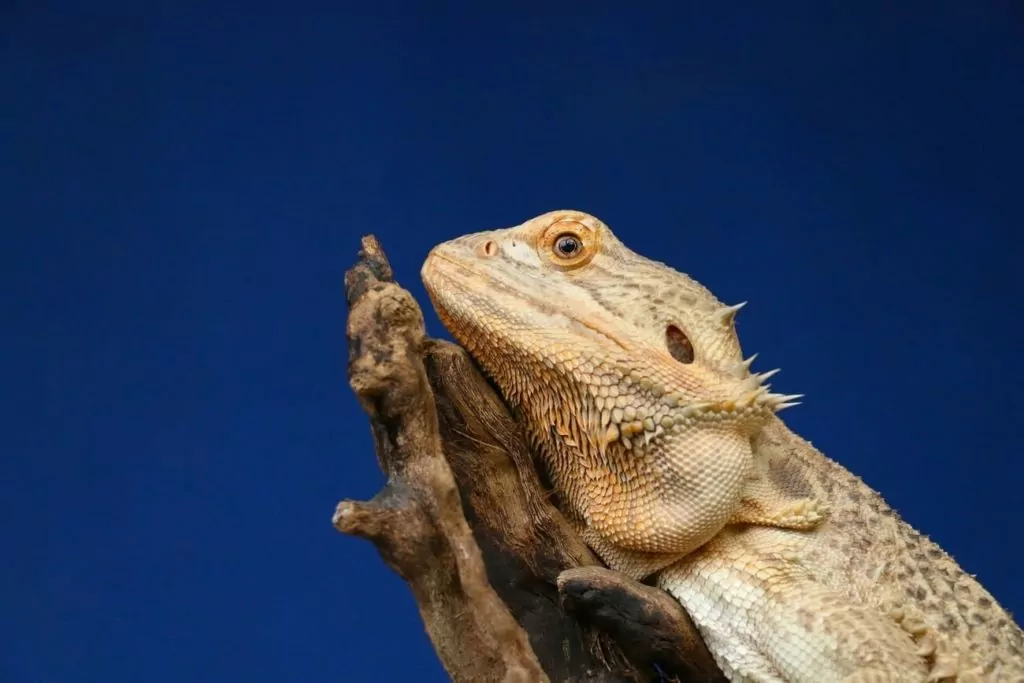“Can bearded dragons eat carrots?” is a question we get more than almost any other food. Their crunchy nature and mysterious nutritional values make them a natural food for owners to be curious about.
This guide will teach you if bearded dragons can eat carrots, and how you should include them into your lizard’s diet.
Table of Contents
Can Bearded Dragons Eat Carrots?
As the owner of a pet bearded dragon, you will want to make sure your lizard is getting the best nutrition possible. Because bearded dragons are omnivores, you’ll need to give your beardie a variety of insects, fruits, greens and vegetables.
Carrots, known to be a healthy part of a human’s diet, can also be a tasty and nutritious part of the vegetable portion of your beardie’s meal plan. This is quite handy, since many owners already have some in their home (or can easily get some the next time they’re at the grocery store).
But in order to better understand how carrots fit into the overall diet of a bearded dragon, you need to understand the details.
The Benefits Of Adding Carrots To Their Diet
Since you now know that bearded dragons can eat carrots, it’s a good idea to spend some time learning about the various nutritional benefits that carrots can bring to your bearded dragon’s diet.
Carrots are good for bearded dragons partially because of the Vitamin A, beta-carotene and dietary fiber they contain. Vitamin A and beta-carotene are known to promote a healthy immune system, maintain healthy skin and help with eye health. The high fiber content of carrots can help keep your beardie’s digestive system working by aiding in the digestion of exoskeletons.
Expert Tip: Because bearded dragons can be susceptible to tooth issues, carrots are a good, low sugar addition to your bearded dragon’s diet.
It’s important to note that even though carrots have plenty of positive benefits for your bearded dragon, they should be given in moderation only. This point will be explained later in more depth.
Can Bearded Dragons Eat Carrot Tops?
Greens are a vital part of a bearded dragon’s diet. This includes the lovely, green carrot tops that can be a delicious and nutritious addition to your beardie’s meal.
Carrot tops have a variety of nutrients such as Vitamin A, Vitamin C, potassium, calcium and Vitamin B6, and they can be given to your bearded dragon at any time.
You don’t need to be nearly as strict with monitoring their intake as you do with the rest of the carrot.
How Often Can They Eat Them?
Despite all of the health benefits of carrots that were previously mentioned, there is a downside to carrot consumption (when done excessively) that you need to be aware of.
Carrots contain lots of Vitamin A, and that may seem like a good thing at first. However, too much Vitamin A in your bearded dragon’s diet can lead to a serious issue called Vitamin A toxicity. This toxicity can cause a myriad of dangerous health problems that include dehydration, a lack of appetite, weight loss and a decrease in energy.

The actual amount of Vitamin A in a carrot is not the real issue. Instead, it’s the overall amount they accumulate in their system.
As a responsible bearded dragon owner, you are most likely giving your beardie some kind of vitamin supplement. A vitamin supplement generally contains lots of Vitamin A, so when you combine supplements with too many carrots, the result can often be Vitamin A toxicity.
Author Note: Also, carrots are not particularly high in calcium, and your beardie buddy needs lots of calcium for good bone health. Filling them up with too many carrots means they might not have room for more important veggies.
Many veterinarians suggest giving carrots to your bearded dragon once or twice per week. It’s best to provide vegetables that are high in calcium and lower in Vitamin A. In other words, save carrots for a once in a while treat.
Different Kinds Of Carrots They Can Eat
In terms of the types of carrots that bearded dragons can eat, the sky’s the limit. Your beardie is going to get basically the same nutritional benefits whether you give them orange, yellow, purple or white carrots.
Both raw and cooked carrots are fine for your beardie, but cooked carrots tend to lose nutrients during the cooking process (you might also notice a difference in their poop). You may have to experiment to see which your bearded dragon likes best.
Expert Tip: There is some debate as to the safety of feeding baby carrots to your bearded dragon. Baby carrots are often washed with a chlorine rinse and may also contain harmful preservatives.
For these reasons, more and more beardie owners are shying away from giving baby carrots to their pet. Still, many others say that baby carrots are perfectly safe. If you do opt for baby carrots, we recommend washing them several times, and buy organic if possible.
How To Serve Carrots To Your Beardie
Whether you decide to give your bearded dragon raw or cooked carrots, there are some simple steps that need to be taken before you can feed them to your beardie.
Steps such as checking each carrot, washing it, and preparing it properly, don’t take long and are critical for the health and safety of your pet. While bearded dragons can eat carrots, it’s important for you to prepare them the right way if you want to avoid health complications.
1. Make Sure The Carrot Is Healthy
The process of selecting carrots for your bearded dragon is pretty much the same as choosing carrots for you or your family.
Look for ones that have a nice, even, healthy looking skin, fresh looking tops and a rich color. Make sure that the carrot doesn’t have any kind of strange spots or rotten appearing areas. If you can, buy carrots that are organic or from a local farm.
Expert Tip: For a fun, summertime project, you can even try growing carrots and other vegetables yourself! This is a great way to maintain top-notch quality.
2. Wash It Thoroughly
Washing the carrot thoroughly is a very important step and must never be skipped. As mentioned above, carrots are often rinsed with a chlorine solution and can also have traces of pesticides and herbicides on the skin.
Unsurprisingly, ingesting too much of this can lead to a variety of health complications for your beardie.
Scrubbing the carrot under cold running water should do the trick, but always make sure that you have given it a quick once-over to make sure that it’s truly clean and dirt-free. Spending a few extra seconds will go a long way in making sure your bearded dragon is eating healthy carrots.
3. Grate The Carrot
If you’re giving cooked carrot to your bearded dragon, then cutting it into small chunks is usually fine (since they’re softer). However, raw carrots need to be treated a bit differently.
Grating the raw carrot with a cheese grater or other fine grater is the best way to prepare raw carrots for your bearded dragon. If you don’t have a cheese grater, you can slice the carrot into very thin slices.
Expert Tip: The idea is to make the carrot pieces softer and easy to eat. Pieces that are too large can be a choking hazard (and potentially cause digestive issues like impaction).
4. Feed Your Beardie
Feeding the prepared carrot to your bearded dragon doesn’t require any complicated steps, but you do have some options.
Our favorite way to serve the carrot is to mix the grated carrot or cooked pieces in with any other greens that you’re giving your beardie. This will help to ensure that your bearded dragon eats other things in the bowl and not just the carrot (which is good for moderation).
We also recommend that you use a sturdy and shallow bowl that won’t easily tip over. A shallow bowl makes it easy for your beardie to reach all the food and reduces eating-related stress.
Closing Thoughts
Now that you know how bearded dragons can eat carrots, it’s time for you to start planning how you want to incorporate them into your existing meal plan. Remember, there’s no rule that says you have to feed your beardie carrots, but a little variety is always nice!
If you have any other questions about this food (or their diet in general) feel free to send us a message and ask. We’re always happy to help our readers!



